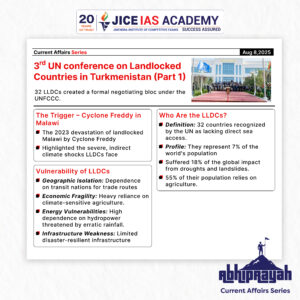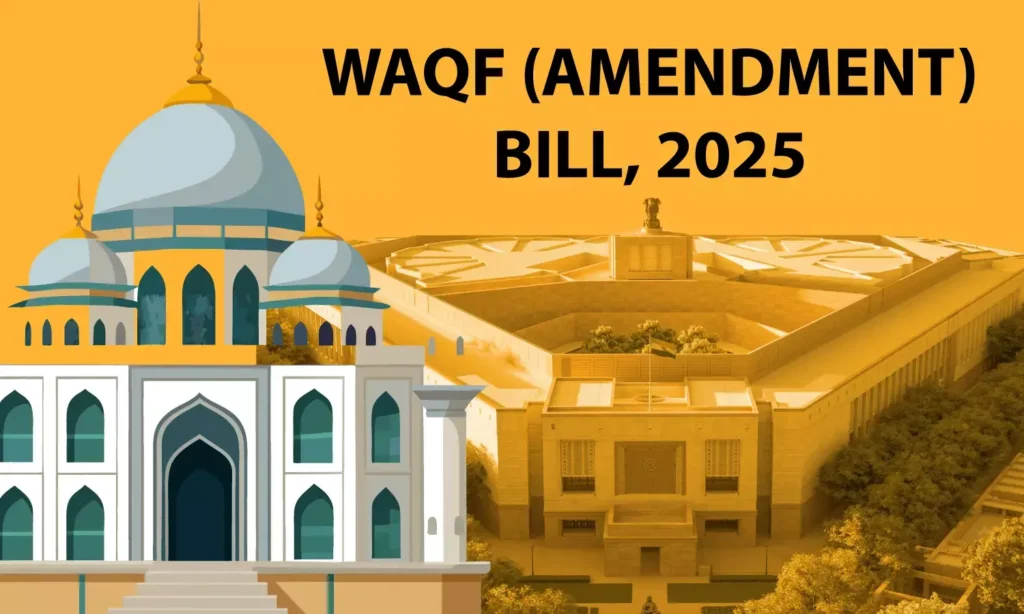UPSC CURRENT AFFAIRS – 03rd April 2025
Lok Sabha passes the Waqf (Amendment) Bill, 2025

Why in News?
The Waqf (Amendment) Bill, 2024, passed in the Lok Sabha, aims to revise the legal framework governing waqf properties.
Introduction
- The Lok Sabha passed the Waqf (Amendment) Bill, 2024, after a heated 12-hour debate, with the government strongly defending its stance against opposition allegations of encroachment on constitutional rights, federalism, and minority rights.
- The Bill was adopted with 288 votes in favor and 232 against.
- The Bill, which seeks to amend laws governing Islamic endowments (waqf properties), is expected to pass smoothly in the Rajya Sabha as well.
Background of the Bill
- The Waqf Act, 1995, provides for the administration, supervision, and management of waqf properties—endowments made for religious or charitable purposes in Islam.
- The government’s amendments in 2013 gave the Waqf Act an overriding effect over other property laws, which the government seeks to reverse through the Waqf (Amendment) Bill, 2024.
Key Provisions of the Bill
- Reversal of 2013 Amendments: The Bill seeks to remove provisions that granted waqf laws precedence over other property laws, ensuring a more balanced legal framework.
- Inclusion of Non-Muslim Members: It allows for the appointment of non-Muslims in waqf boards and councils, which has been a contentious issue.
- Emphasis on Property Regulation: The Bill claims to deal solely with properties and administration, without interfering in religious matters.
- Repeal of Mussalman Waqf Act, 1923: Alongside the amendment bill, the Mussalman Waqf (Repeal) Bill, 2024 was also passed, repealing an outdated law concerning waqf properties.
Broader Implications
- Legal and Constitutional Impact
- The amendment redefines the status of waqf properties in legal disputes, ensuring they do not override other land laws.
- The inclusion of non-Muslims in waqf boards could be challenged in court as a violation of the right of religious communities to manage their own affairs under Article 26 of the Indian Constitution.
- Political Significance
- This is the fourth major legislative action by the government related to Muslim personal laws, following:
- Criminalization of Triple Talaq
- Citizenship (Amendment) Act, 2019 (CAA)
- Implementation of the Uniform Civil Code (UCC) in Uttarakhand
- This is the fourth major legislative action by the government related to Muslim personal laws, following:
- Impact on Minority Rights
- The opposition argues that this amendment weakens autonomy in waqf administration, potentially leading to disputes over religious property rights.
- It is a necessary reform to curb mismanagement and favoritism within waqf boards.
Right to Property
- The Right to Property was initially a Fundamental Right under Article 19(1)(f) and Article 31 of the Indian Constitution.
- However, it was later removed as a Fundamental Right and given the status of a legal/constitutional right under Article 300A by the 44th Constitutional Amendment Act, 1978.
Historical Evolution
- Original Position (1950)
- Article 19(1)(f): Guaranteed citizens the right to acquire, hold, and dispose of property.
- Article 31: Stated that no person shall be deprived of their property except by the authority of law, and provided for compensation in case of acquisition by the State.
- Amendments and Changes
- 1st Amendment (1951): Added Article 31A and 31B, enabling the government to acquire land for land reforms and placed certain laws under the Ninth Schedule to protect them from judicial review.
- 4th Amendment (1955): Limited the power of courts to question compensation given by the government for land acquisition.
- 25th Amendment (1971): Replaced “compensation” with “amount”, reducing the obligation to provide market-value compensation.
- 44th Amendment (1978):
- Deleted Article 19(1)(f) and Article 31, thereby removing the Right to Property from the list of Fundamental Rights.
- Introduced Article 300A, making the Right to Property a legal/constitutional right, stating that no person shall be deprived of their property except by authority of law.
Current Status (Article 300A)
- The Right to Property is now a constitutional/legal right and not a Fundamental Right.
- The government can acquire private property for public purposes, but it must be done lawfully.
- Citizens cannot challenge property deprivation under Fundamental Rights (Part III) but can seek remedy under legal provisions.
Judicial Interpretations
- Kesavananda Bharati Case (1973)
- Upheld the power of Parliament to amend the Constitution but ruled that the basic structure of the Constitution cannot be altered.
- Waman Rao Case (1981)
- Reaffirmed that laws placed under the Ninth Schedule after April 24, 1973, are open to judicial review.
- Tukaram Kana Joshi v. Maharashtra (2013)
- Supreme Court ruled that state cannot take private property without following due legal procedure.
Conclusion
- The Waqf (Amendment) Bill, 2024, represents a significant shift in the governance of Islamic endowments in India. While the government asserts it is a reform measure aimed at legal parity and property management, the opposition views it as an attack on minority rights.
- With the Bill set for clearance in Rajya Sabha, its long-term implications on legal, political, and religious affairs remain to be seen.

3rd UN conference on landlocked countries
UPSC CURRENT AFFAIRS – 08th August 2025 Home / 3rd UN conference on landlocked countries Why in News? At the

Issue of soapstone mining in Uttarakhand’s Bageshwar
UPSC CURRENT AFFAIRS – 08th August 2025 Home / Issue of soapstone mining in Uttarakhand’s Bageshwar Why in News? Unregulated

Groundwater Pollution in India – A Silent Public Health Emergency
UPSC CURRENT AFFAIRS – 08th August 2025 Home / Groundwater Pollution in India – A Silent Public Health Emergency Why

Universal banking- need and impact
UPSC CURRENT AFFAIRS – 08th August 2025 Home / Universal banking- need and impact Why in News? The Reserve Bank

India’s “Goldilocks” Economy: A Critical Appraisal
UPSC CURRENT AFFAIRS – 08th August 2025 Home / India’s “Goldilocks” Economy: A Critical Appraisal Why in News? The Finance

U.S.-India Trade Dispute: Trump’s 50% Tariffs and India’s Oil Imports from Russia
UPSC CURRENT AFFAIRS – 07th August 2025 Home / U.S.-India Trade Dispute: Trump’s 50% Tariffs and India’s Oil Imports from

Eco-Friendly Solution to Teak Pest Crisis: KFRI’s HpNPV Technology
UPSC CURRENT AFFAIRS – 07th August 2025 Home / Eco-Friendly Solution to Teak Pest Crisis: KFRI’s HpNPV Technology Why in

New Species of Non-Venomous Rain Snake Discovered in Mizoram
UPSC CURRENT AFFAIRS – 07th August 2025 Home / New Species of Non-Venomous Rain Snake Discovered in Mizoram Why in


